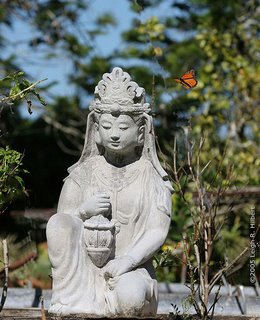
"Now think of the person sitting nearest you as your own child, and you are the mother, embracing, supporting and caring, wanting to help, being concerned." (Ven. Ayya Khema, Shambhala Sun, January 2007. Pg. 62.)
This is part of a wonderful practice of compassion taught in Buddhism. In this meditation, after settling your body and mind, you contemplate your mother, and feel the love and compassion and softness wash over you. As you sit in this field of love, you then consider yourself as the mother, and turn your attention to your child, some other person in your life. You start with friends and relatives, proceed to neutral parties, and eventually you are able to feel the love and protection only a mother has for your enemies. You bathe in this feeling of compassion and loving-kindness, seeing the nature of this wonderful mental seed, planting it deep so that it comes forth naturally in your everyday life. The more you practice in this way, the easier it becomes, and the more you find it surfacing throughout your day. Like all things, there will be ups and downs. But persevere, and water the mental seed of compassion that resides in all of us.





